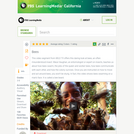
In this video segment from WILD TV, learn about bees and the different techniques for handling them.
- Subject:
- Arts and Humanities
- Material Type:
- Lecture
- Provider:
- PBS LearningMedia
- Provider Set:
- Teachers' Domain
- Date Added:
- 08/26/2008

In this video segment from WILD TV, learn about bees and the different techniques for handling them.

This presentations reviews themes, characters, setting, point of view, and use of irony in Arthur Miller's The Crucible. This presentation was created by Maren Florence.
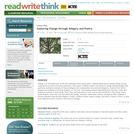
Students read an example of allegory, review literary concepts, complete literary elements maps and plot diagrams, create a pictorial allegory, and write diamante poems related to the theme of change.
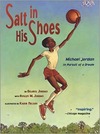
Are you looking for an enticing way to introduce identifying the theme of a story to your students? This lesson on identifying the theme of a text was created by Jennifer Bauer as an introductory lesson to understanding and analyzing a text to identify a common theme within the text. This lesson engages students by using the read aloud "Salt in His Shoes", a storybook on Michael Jordan's struggles as an adolescent, as a way to gain an understanding of the literary element of theme. This English Language Arts lesson is designed for Grades 3-5, but could also be adapted for middle school students as well. This lesson plan addresses the following NDE Standards: LA 3.1.6.d Summarize a literary text and/or media, using key details to identify the theme. LA 4.1.6.d Summarize a literary text and/or media, using key details to identify the theme. LA 5.1.6.d Summarize and analyze a literary text and/or media, using key details to explain the theme.It is expected that this lesson will take students 60 minutes to complete.
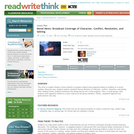
This twist on readers theater has students prepare original news programs based on incidents in a recent reading, as they explore standard literary elements of character, conflict, resolution, and setting.
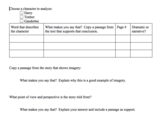
Whether freshmen or AP seniors, students often forget to back up their statements about texts with evidence for support or to begin with the text when considering answers to literary questions. The more we ask them to provide textual evidence in discussion, analysis activities, essays, and on tests, the more ingrained this important skill will become. This lesson was designed for freshmen at the beginning of the year as they begin analyzing literature. The handout and question refer specifically to the story "Poison" by Roald Dahl, but feel free to remix the lesson to work with another text, older students or nonfiction.
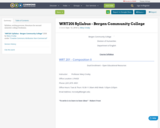
Syllabus, writing process, literature for second semester college freshmen.

ConferencesWe will meet one-on-one to discuss your Outline/Draft/Works Cited pageContinue using Worksheets from last week: *Working with Sources and *Outline
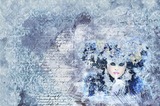
This week you will continue doing research, as needed, and also take the feedback you received during conferences and make revisions to your essay. We will also begin our Drama unit. You can read about the elements of drama and then watch a performance of Edgar Allen Poe’s short story “The Cask of Amontillado.” Research:Review the tutorial link (if you need to) for how to access the library database. Keep researching, reading, writing, using the research worksheet.Revision:When revising you want to make sure that you are developing your ideas. Push your thinking by asking yourself so what? who cares? why does this matter. So when you provide a quote from the poem, take the time to explain what you see the line to mean. Similarly, when you quote from one of your sources, also explain in your own words what the critic is saying, what you think it means. Remember to always keep your thesis in sight. How does what you are saying in each paragraph connect to your thesis?Read your paper aloud with a pen in hand. Make sure ideas are clear; that one idea flows to the next; that you are providing textual evidence for points you make (quotes). There is a self-edit worksheet to help you with revisions.

This we will continue our DRAMA unit and view a music video by Common called "Testify." You'll see a link for applying critical lenses (a skill you practiced at the beginning of the semester when we read "The Yellow Wallpaper) that we'll review.The main objectives for this week are to learn about a new genre, and review and practice the analytical skills we've been using this semester. Watch the video once. Then review the link about critical perspectives/lenses. Watch the videos again. Can you apply a lens and see something more in the video that you did not see the first time? In this week’s journal you will apply a lens. Find a fresh perspective with which to analyze the video.So that you can start thinking ahead to our final writing assignment, the guidelines for Essay 4 are posted at the end of this week's unit.

This week is Student Presentations.

You have made it to the top of the mountain and from here you should have a clear view of the distance you have traveled this semester. We began with the writing process and analyzing literature. Then we worked on making a claim about a work of literature and using textual evidence to support that claim. We've practiced formatting, framing & citing quotes and developing ideas. Then you progressed to analyzing and incorporating the ideas of others, through research, into the more sophisticated argument you were making about a poem. This week you will reflect on that writing.You will read a poem by Billy Collins, "Writing in the Afterlife" (he has a dry sense of humor. Consider the title as you are reading), and you'll read "3 of 16 Drafts of Elizabeth Bishop's 'One Art.'" This second reading shows you the process of a very famous villanelle, a 19 line poem that follows a specific rhyme scheme. At the end of the reading you can read Bishop's final revised poem. It is interesting to see the drafts of how this poem came into being. (See, even pro's write many drafts!)After you check out the readings, you can write your final journal and reflect on your writing this semester. Have you learned/tried/realized anything new about your writing? What worked/didn't work? What strategies will you will use for other writing assignments in other classes going forward?I hope you enjoyed the stories and poems we read this semester. Best of luck to everyone, in your studies and in life.

Welcome to Composition II.To begin, check out the SYLLABUS. It explains all of the goals, requirements and policies for the course, as well as provides a detailed course calendar of readings, activities and assignments. In Comp II we will read poems and stories and then you will be writing essays about the literature we read. There is a link where you can review literary terms and then take a quiz to test your knowledge. You can take the quiz as many times as you like. In literature, the meaning is not explicitly stated. (That's what essays are for :). With literature there are multiple interpretations of what a story or poem means. You can have any opinion you wish; you just need to have reasons and use evidence from the text to support/prove/illustrate your points. It is through the process of questioning and writing that you will come up with deeper ideas than you would if you merely read the story. It is my hope that you enjoy the stories and poems we will read, and also enjoy the process of analyzing and writing.This first week you will read "Bird by Bird" by Annie Lamott and consider your own writing process. Many of her ideas about prewriting, writing and revising will be helpful to you in the writing you do for this course. Then you will read and write about the short story "A&P" by John Updike.

This week you will read the short story “Greasy Lake” by T.C. Boyle. You will then write a short paper (500 words) about one of the stories you read. There will be a prompt with topic choices. Writing a short paper will help us focus on the intro, body paragraph and conclusion. Each paragraph has special conventions. You can view the Powerpoint and other links provided in this week's unit for review of the components of writing an argument essay about a work of literature.Let’s practice what Annie Lamott discusses with great humor about the writing process in "Bird by Bird." She outlines a way to get started drafting (aka writing a $hit#y first draft) in order to just get ideas down, then writing the up draft…fixing it up for clarity, support and development of ideas, and then finally the dental draft: fixing the small details like spelling, grammar and formatting.There is a link for using quotes. On your second revision you can double check that the quote you use is framed and cited correctly. You want to pick quotes where you can show your analysis. Develop the quote by explaining its significance and meaning in your own words and showing how it advances your main point (thesis).There is also a link for MLA formatting. Formatting is part of the dental draft, the fine tuning after you have drafted and revised for the big ideas, development and support.

This week we will learn about additional ways in which we can analyze a text. A work can be considered for its portrayal of gender, class, culture. Check out the link: “Read about Critical Approaches in Literature.” It gives us another way to see the story. By considering how gender is portrayed, for example, we are using a specific lens (feminist) with which to view the text. Try using this lens when reading “The Yellow Wallpaper” or “The Story of an Hour.”There will be a short quiz on “The Yellow Wallpaper”. Then you will write in your journal and apply a lens.Find a relaxing place to read this week's stories. "The Story of an Hour" is very short but excellent. "The Yellow Wallpaper" is longer but this is most student's favorite story. Remember to annotate and practice close reading. Enjoy reading some great literature!

This week you write Essay 2. It will be a Compare/Contrast essay, a common assignment, but sometimes a tricky form. In order to help you better understand how comparing and contrasting two things can help you use one as a lens to better see the other, you will first view a Powerpoint about comparing and contrasting two sculptures about love. Be sure to practice writing c/c thesis statements as outlined in the PPT.Then check out the list of prompts for the various texts we've read that share a similar theme. Your mini-essay can be about marriage, or coming of age, for example. I will leave it up to you; but you will compare two texts and make a claim. Then illustrate how that claim is true by quoting from the texts. For this essay, you will freewrite until you can make a claim and come up with reasons why you believe your claim is true. Then hunt for quotes to support your claim. Now you will have an outline. With an outline you can focus on the essential elements of an essay: thesis, support, evidence. Once you have these, you have the structure of your essay and will be better able to move forward advancing an argument and not lapsing into plot summary.There is a classic essay on the writing process called "The Maker's Eye" by Donald Murray. You can read this before or after you create a draft of Essay 2, but definitely before you begin revising as Murray has many good suggestions that you can apply when revising this essay.Make sure you view the Powerpoint for how to write a compare contrast thesis. Do not write a thesis that says "there are many similarities and some differences between ____ and _____."" Look closely at slide #'s 6,7 and 8 for drafting your thesis.Use the self-edit worksheet for final revisions.
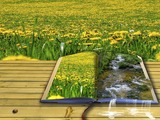
This week we will read about poetry and read & discuss some great poems. Now for those of you who may be groaning and saying you don't like poetry and that it's too difficult, I’d like to say this: Poetry deals with intense emotions and deep ideas. A poet tries to make the reader feel something, so they do not TELL us explicitly what their point is. They SHOW us through imagery: sights, sounds, smells, touch so that we can SEE/FEEL what they mean. If you want someone to say something directly, read the newspaper ;)Poetry is song. It requires us to use our imagination. Try to appreciate the imaginative leaps poets make when they use metaphors and similes to compare one thing to another so that we can see what they are showing us. Tune into the music of the lines. Appreciate their brevity. It's pretty amazing how much a poet can say in such a small space. Then after reading some great poems, you will journal about them. Next, check out the links on the Research Paper. The Guidelines give you detailed information on this assignment. In a nutshell though, you will pick ONE poem from the list in the guidelines to write about. You can check out the links provided to learn about your poet and the time period in which they were writing. There's a link to Poetry Foundation and Poets.org. Just type in the name of your poet. You will NOT be writing a biography, but sometimes you can see more in the poem if you have the context of the poem. Make some notes as you go. Next week you will begin writing about your research paper poem.

SPRING BREAKYou can continue researching your poem and poet. This week there is also an extra credit option.**EXTRA CREDIT ASSIGNMENTRead "Love & Other Catastrophes" and then look at your own playlist. Can you tell a story using the titles of the songs from your playlist? This is a fun assignment and is optional. Post poem for extra credit.

This week you will continue reading about the poet you chose last week for the Research Paper assignment. Then you will read the guidelines and check out the sample for writing a BIO poem about your chosen poet. There's a template you'll follow to help you craft this poem. It’s a fun way to learn about these amazing writers.Next, we will do a pretty cool exercise, called “Writing in the Zones” from Bard College. There are detailed guidelines and a link to show you how to set up your paper (photo) so that you can complete this exercise. The other link gives you the step by step guide for how to fill in the zones.Once you’ve completed this exercise, use what you wrote in each zone to write Essay 3. Use the Self-edit worksheet to help you with revisions. If you haven't already done so, now is a good time to go back over Essays 1 & 2 in order to view my feedback. See what you are doing right and review areas you need to strengthen.

As we continue with poetry, we will look closely at one poem, “Musee des Beaux Arts” by W.H. Auden, and two articles of literary criticism. This week’s unit will give you practice analyzing a poem as well as literary criticism about a poem.Literary criticism does not mean other writers are criticizing Auden’s work. Instead, scholars are critically analyzing his poem. Just like the papers you have been writing all semester, there are scholars who read and analyze literature, who write critical analysis essays about that literature. These writers read each other’s analyses and sometimes agree and sometimes argue about the meaning of a work. In this way, writers are in conversation with one another about the work. By writing this multi-source (research) paper, you will be joining that conversation.For your journal you’ll write brief summaries of Auden’s poem and each essay of literary criticism.Next, you will access the library database so that you can find literary criticism on the poem you chose for your research paper. You will type in the title of your poem into the databases in the link provided: “Access Library databases.” The databases you need are all conveniently located in this link. Scroll down to where it says “Start Here to find Literary Criticism” and use the database links provided: Literary Resource Center, Literature Reference Center, Bloom Literature.*There is also a research tutorial toward the end of this week's unit with a couple of short videos which discuss literary research and how to access the database.It is important to acknowledge that research takes time. There's a lot of surfing around and reading and weeding through until you find sources that will pertain to your argument. Patience and time management will be needed to write a research paper. The idea of writing a longer, multi-sourced paper should not overwhelm you if you remember Bird by Bird. One step at a time. Remember to print off articles you know you'll use. Read with a pen in hand. Annotate. Let's use the steps we have been practicing. Use the page as a place to think. Freewrite. Don't worry about writing paragraphs initially. Just get some ideas down.A note about Literary Criticism: Sometimes literary criticism is challenging reading. One of these articles is easier to understand than the other. Print off both articles. They are short. Use a pen to underline important ideas and write in the margin what you do understand. Keep moving forward, reading the article, even if you don't understand all it is saying. You will get to parts that you do understand. Underline and write key concepts in the margins. If you go back and reread again, you will understand more than you did the first time. It is okay if you still don't understand everything, but just like with the writing in the zones exercise, you can focus in on the key ideas you do understand :)There is a link called “How to Use Literary Criticism in your Research Paper.” It lays out (in step by step fashion) how to incorporate the ideas of others alongside what you are saying about the poem. As you begin writing your research paper, you can use ideas from your Writing in the Zones exercise or Essay 3, though you will probably change your thesis along the way as you start doing research.